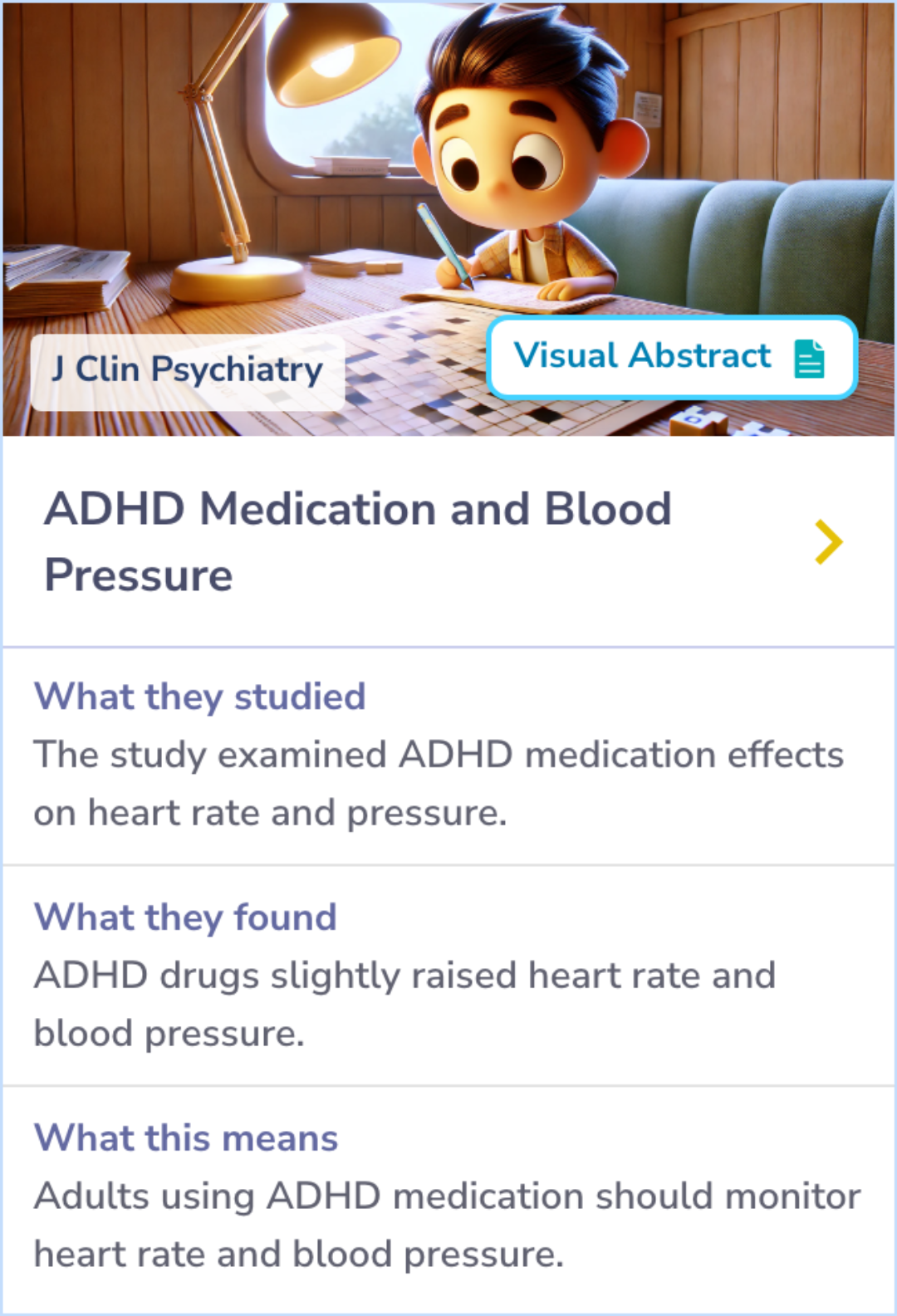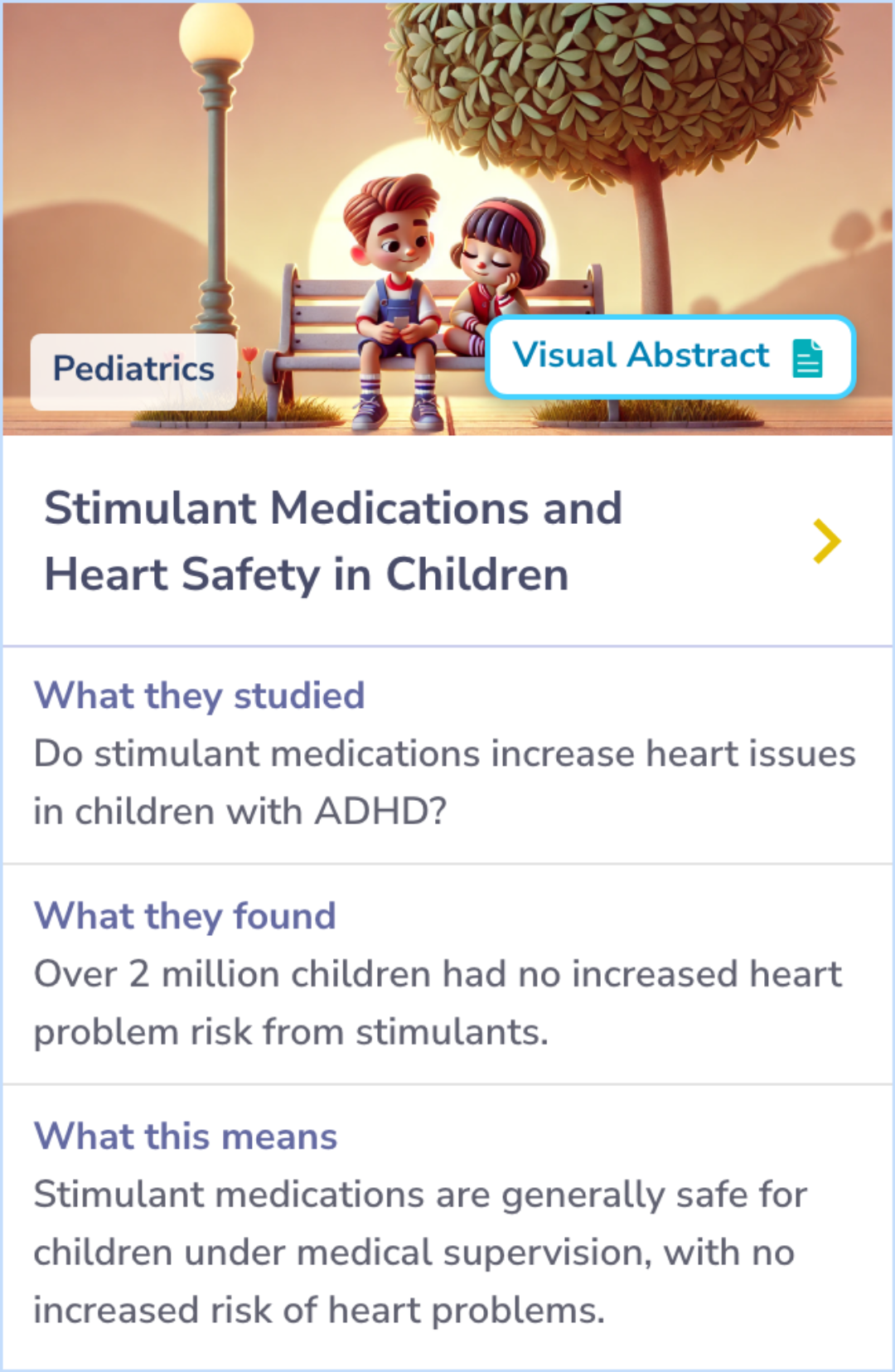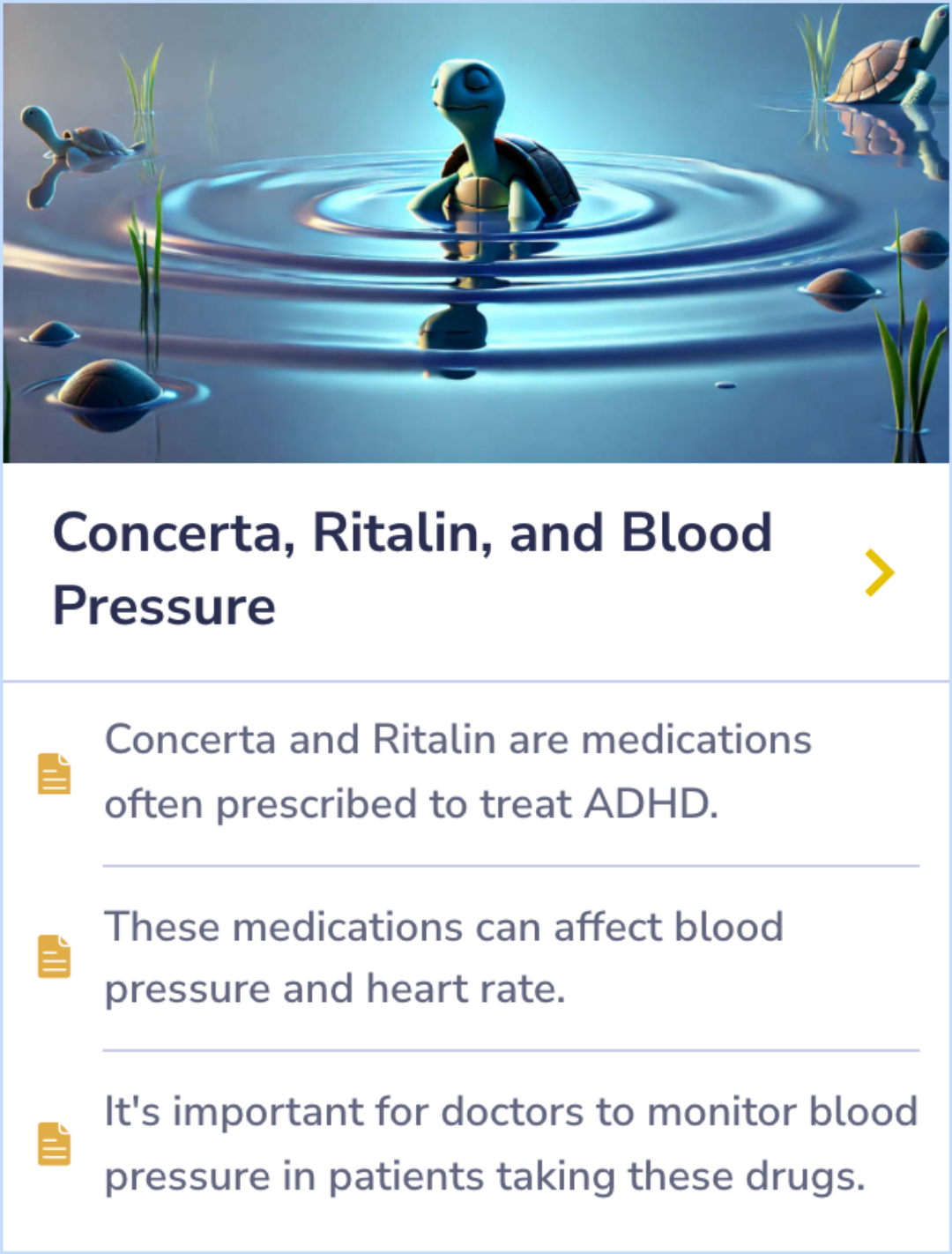Adderall
Evidence Based Answers
Studies on Adderall and Cardiovascular Side Effects
Adderall can raise heart rate and blood pressure, increase heart attack or stroke risk in vulnerable individuals, and requires regular monitoring to ensure safety.
Published: October 25, 2024
Click to explore a section:
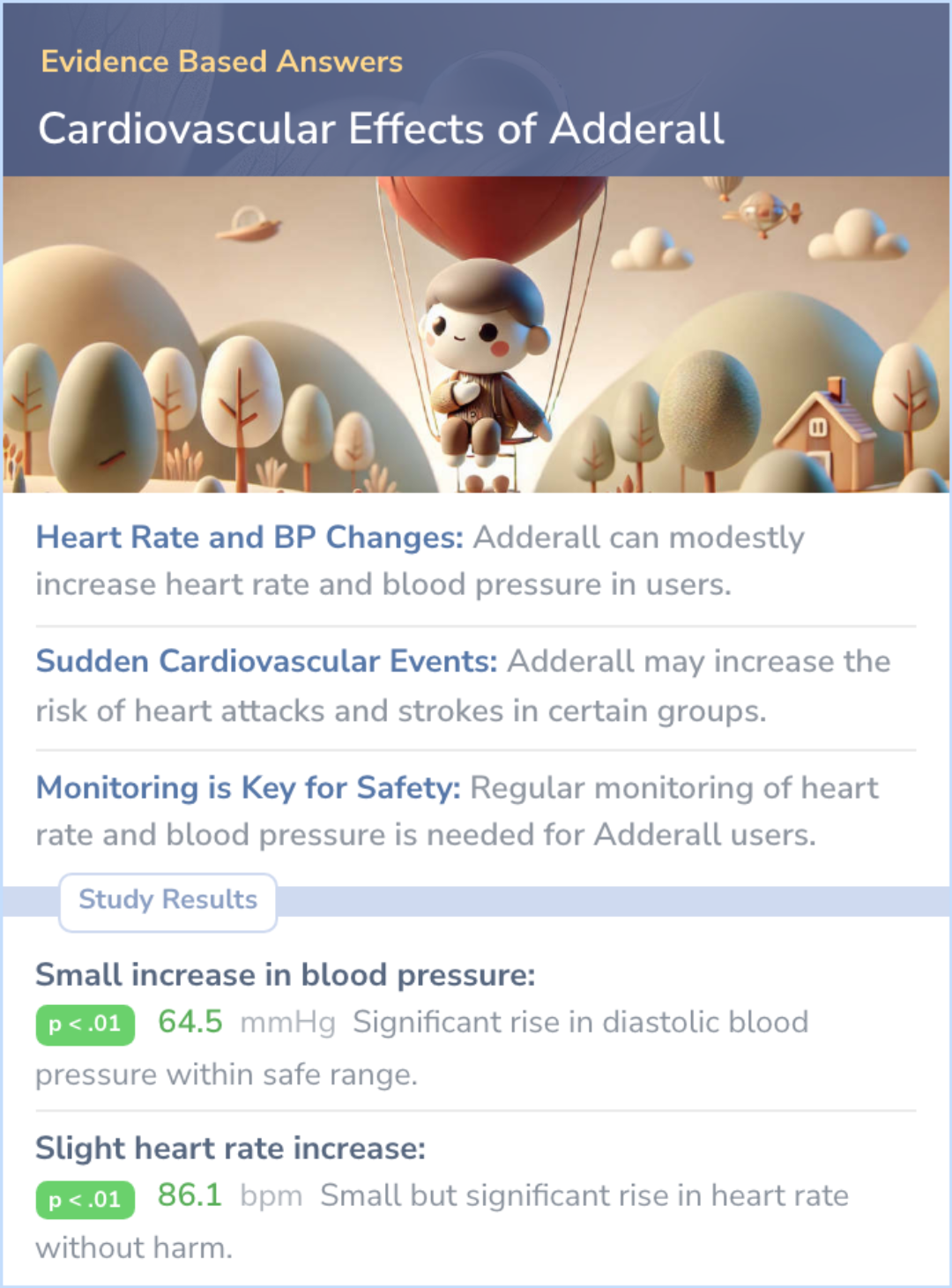
Adderall may increase heart rate, blood pressure, and heart attack risk; monitoring is essential.
Studies Summary
🧒
Modest Cardiovascular Effects in Youth
A study found minor short-term cardiovascular effects from Adderall in youths with ADHD, showing no major changes in blood pressure or pulse.
❤️
Similar Cardiac Risks for Medications
Research comparing methylphenidate and amphetamine salts revealed similar risks for heart-related emergency visits among young users.
🩺
Adderall Effects on Heart Rate and Blood Pressure
Adderall can increase heart rate and blood pressure, so monitoring is advised, especially for individuals with existing conditions.
Highly Cited Studies
Long term Effects of Methylphenidate in Adults
Peer Reviewed Study 1
Minimal Short-Term Cardiovascular Effects of Adderall in Youths with ADHD
Peer Reviewed Study 2
Comparing Cardiac Risks: Methylphenidate vs. Amphetamine Salts
Peer Reviewed Study 3
Short-term Efficacy and Safety of ADHD Medications Differ Across Age Groups
Peer Reviewed Study 4
Evaluating Adderall's Effectiveness and Side Effects in Treating ADHD in Children
Background: How Adderall Affects Heart Rate and Blood Pressure
Adderall, like other stimulant medications, can cause increases in both heart rate and blood pressure. These increases are generally modest, but for some individuals, the changes can be more significant. Monitoring heart rate and blood pressure is important, especially for patients with preexisting conditions like hypertension.
Even small changes can affect long-term cardiovascular health. Regular monitoring helps ensure that these changes do not reach dangerous levels.
Even small changes can affect long-term cardiovascular health. Regular monitoring helps ensure that these changes do not reach dangerous levels.
“
Source Quotes:
Stimulant medications cause a modest increase in average blood pressure (about 2 to 4 mmHg) and average heart rate (about 3 to 6 bpm), and individuals may have larger increases.
Increased heart rate and blood pressure are among the most frequent treatment-emergent adverse events reported with psychostimulant treatment.
Background: Risks of Sudden Death and Heart Problems with Adderall
Adderall has been linked to sudden death and serious cardiovascular events, such as heart attacks or strokes, particularly in individuals with preexisting heart conditions. These risks are more pronounced in adults and older adults who are more likely to have underlying cardiovascular issues.
Patients with a family history of heart disease or existing heart conditions should discuss these risks with their doctor before starting Adderall.
Patients with a family history of heart disease or existing heart conditions should discuss these risks with their doctor before starting Adderall.
“
Source Quotes:
Dextroamphetamine and amphetamine may cause sudden death, heart attack, or stroke in adults, especially adults with heart defects or serious heart problems.
Sudden deaths, stroke, and myocardial infarction have been reported in adults taking stimulant drugs at usual doses for ADHD.
Background: Importance of Cardiovascular Monitoring During Adderall Use
Patients taking Adderall, especially those with known cardiac abnormalities, should undergo regular cardiovascular monitoring. This includes checking blood pressure, heart rate, and other signs of cardiovascular stress. Regular monitoring is recommended to ensure that the medication is not causing any harmful cardiovascular effects.
If any concerning symptoms such as chest pain or shortness of breath occur, immediate medical attention is necessary.
If any concerning symptoms such as chest pain or shortness of breath occur, immediate medical attention is necessary.
“
Source Quotes:
Cardiac monitoring should occur on at least an annual basis, and concerning signs include pulse or blood pressure >95th percentile for age and the presence of any cardiovascular symptoms.
All patients should be monitored for larger changes in heart rate and blood pressure.
Background: Peripheral Vasculopathy and Cardiovascular Concerns with Adderall
In addition to the risks of heart rate and blood pressure increases, Adderall has been associated with peripheral vasculopathy, including Raynaud’s phenomenon. This condition can lead to poor circulation, causing symptoms like cold fingers and toes or more severe issues like digital ulceration. Patients should be monitored for signs of peripheral vasculopathy, and dose adjustments may be necessary if symptoms arise.
Early detection and management are important to prevent more serious complications associated with this side effect.
Early detection and management are important to prevent more serious complications associated with this side effect.
“
Source Quotes:
Stimulants, including Adderall®, used to treat ADHD are associated with peripheral vasculopathy, including Raynaud’s phenomenon. Signs and symptoms are usually intermittent and mild; however, very rare sequelae include digital ulceration and/or soft tissue breakdown.
Peer Reviewed Study
Study: Minimal Short-Term Cardiovascular Effects of Adderall in Youths with ADHD
This study examined the cardiovascular effects of Adderall (ADL) in youths aged 4 to 17 with ADHD. Patients were treated with either methylphenidate (MPH) twice daily or ADL once daily and evaluated under five conditions: baseline, placebo, and doses of 5 mg, 10 mg, or 15 mg. Resting pulse, diastolic blood pressure, and systolic blood pressure were measured after one week of treatment.
The results showed that both ADL and MPH had modest short-term cardiovascular effects, with no clinically significant changes observed in the patients' blood pressure or pulse during the trial.
The results showed that both ADL and MPH had modest short-term cardiovascular effects, with no clinically significant changes observed in the patients' blood pressure or pulse during the trial.
author
Findling RL, Short EJ, Manos MJ
journal
J Am Acad Child Adolesc Psychiatry
Date Published
2001 May
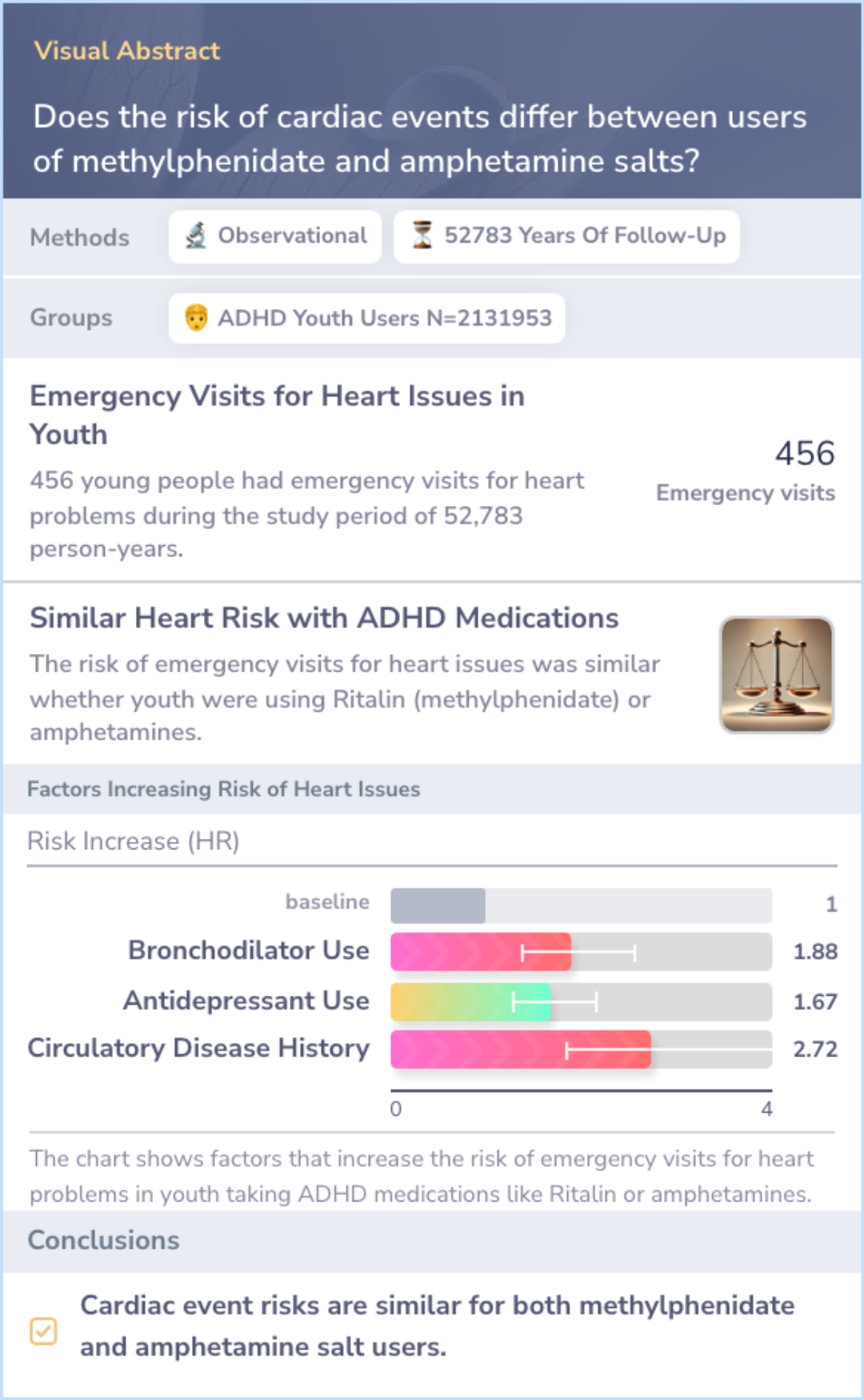
Peer Reviewed Study
Study: Comparing Cardiac Risks: Methylphenidate vs. Amphetamine Salts
This study compared the risk of cardiac events in youth using methylphenidate and amphetamine salts. It analyzed data from over 2 million children and adolescents enrolled in Florida Medicaid, focusing on those newly prescribed these medications for ADHD. Cardiac events were defined as emergency department (ED) visits for heart-related issues, and the study adjusted for various factors like age, gender, and medical history.
Results showed that the risk of cardiac ED visits was similar between current and former users of both methylphenidate and amphetamine salts.
Results showed that the risk of cardiac ED visits was similar between current and former users of both methylphenidate and amphetamine salts.
author
Winterstein AG, Gerhard T, Shuster J, Saidi A
journal
Pediatrics
Date Published
July 2009

Peer Reviewed Study
Study: Short-term Efficacy and Safety of ADHD Medications Differ Across Age Groups
This meta-analysis looked at different ADHD medications to see how effective and safe they are for children, adolescents, and adults. The researchers found that, in the short term, methylphenidate worked well for children and adolescents, while amphetamines were better for adults.
However, some medications had more side effects than others, especially amphetamines and modafinil. This study suggests which medications might be preferred based on age and side effects.
However, some medications had more side effects than others, especially amphetamines and modafinil. This study suggests which medications might be preferred based on age and side effects.
author
Cortese S, Adamo N, Del Giovane C, Mohr-Jensen C, Hayes AJ, Carucci S, Atkinson LZ, Tessari L, Banaschewski T, Coghill D, Hollis C, Simonoff E, Zuddas A, Barbui C, Purgato M, Steinhausen HC, Shokraneh F, Xia J, Cipriani A
journal
Lancet Psychiatry
Date Published
2018 Sep

Peer Reviewed Study
Study: Evaluating Adderall's Effectiveness and Side Effects in Treating ADHD in Children
This study focused on evaluating how well Adderall works for children diagnosed with ADHD and what side effects they experience. 154 children participated, and they were given two different doses of Adderall. The results showed that Adderall had a high effectiveness rate, with 89% of children responding positively based on parent or teacher criteria. Parents also reported side effects like reduced appetite, stomachaches, and insomnia, especially at higher doses. These side effects were generally similar to those seen with other ADHD medications.
The study was conducted in a rural clinic, and children aged 5 to 18 years old were included. Adderall was compared with a placebo in a controlled setting, and each child served as their own control. The study used both parent and teacher observations to assess effectiveness.
The study was conducted in a rural clinic, and children aged 5 to 18 years old were included. Adderall was compared with a placebo in a controlled setting, and each child served as their own control. The study used both parent and teacher observations to assess effectiveness.
author
Ahmann PA, Theye FW, Berg R, Linquist AJ, Van Erem AJ, Campbell LR
journal
Pediatrics
Date Published
2001 Jan

Key Takeaways
Conclusions
Adderall, a medication frequently used to manage ADHD, is known to modestly affect heart rate and blood pressure. While studies indicate that these short-term changes are generally minor and not clinically significant, especially in youth, certain individuals may experience more pronounced effects. Regular cardiovascular monitoring is advised, particularly for those with preexisting heart conditions, to mitigate any potential risks associated with its use.
Comparative studies show that the risk of severe cardiac events does not significantly differ for methylphenidate and amphetamine salts, two common medications for ADHD, reinforcing the need for tailored treatment based on age and potential side effects. Additionally, peripheral vasculopathy is an associated risk, requiring vigilant observation and possible dose adjustments to prevent severe complications.
Comparative studies show that the risk of severe cardiac events does not significantly differ for methylphenidate and amphetamine salts, two common medications for ADHD, reinforcing the need for tailored treatment based on age and potential side effects. Additionally, peripheral vasculopathy is an associated risk, requiring vigilant observation and possible dose adjustments to prevent severe complications.

Evidence Summary
ADHD Medication: Impact on Blood Pressure and Heart Rate
Researchers focused on the effects of various medications used for ADHD treatment on cardiovascular health. The study involved adults diagnosed with ADHD who participated in clinical trials evaluating both stimulants and nonstimulants. They observed that medications like amphetamines, bupropion, and desipramine led to slight increases in both blood pressure and heart rate.
These findings are statistically significant, signaling a need for careful monitoring of cardiovascular parameters in patients receiving ADHD treatments. While the study noted small increases in blood pressure and heart rate, these changes emphasize the necessity of regularly checking these vital signs for patients under ADHD medication.
These findings are statistically significant, signaling a need for careful monitoring of cardiovascular parameters in patients receiving ADHD treatments. While the study noted small increases in blood pressure and heart rate, these changes emphasize the necessity of regularly checking these vital signs for patients under ADHD medication.
Evidence Summary
Comparing Cardiac Risks in ADHD Stimulants
The study explores safety concerns surrounding central nervous stimulants used for treating ADHD, particularly focusing on methylphenidate and amphetamine salts. Researchers used data from over 2 million children and adolescents to assess cardiac risks.
Results showed no significant difference in emergency cardiac visits between users of these stimulants, whether in current or former use, when adjusting for various factors, like age and health history.
Results showed no significant difference in emergency cardiac visits between users of these stimulants, whether in current or former use, when adjusting for various factors, like age and health history.
Evidence Summary
Monitoring Cardiovascular Effects of ADHD Medications
Concerta and Ritalin, common ADHD medications, can affect blood pressure and heart rate, akin to the cardiovascular effects discussed with Adderall. Regular check-ups are crucial to ensure patient safety during treatment. Doctors need to closely monitor these vital signs to prevent potential health risks that can arise from these medications.
Highlighting the need for regular monitoring, this underscores the careful attention required when administering ADHD medications.
Highlighting the need for regular monitoring, this underscores the careful attention required when administering ADHD medications.
